2024届高考英语【读后续写】五年高考英语真题分层精练 (一)如何读原文 课件(共21张PPT)
文档属性
| 名称 | 2024届高考英语【读后续写】五年高考英语真题分层精练 (一)如何读原文 课件(共21张PPT) |  | |
| 格式 | pptx | ||
| 文件大小 | 943.1KB | ||
| 资源类型 | 教案 | ||
| 版本资源 | 人教版(2019) | ||
| 科目 | 英语 | ||
| 更新时间 | 2024-04-16 08:20:58 | ||
图片预览

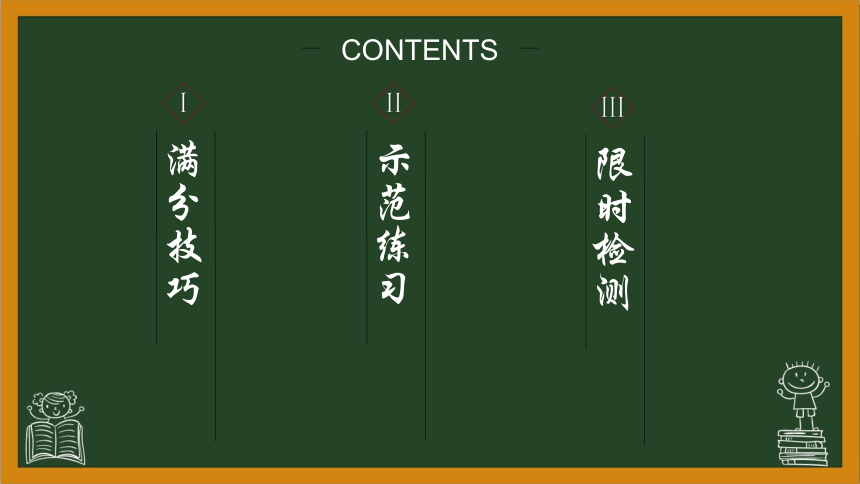
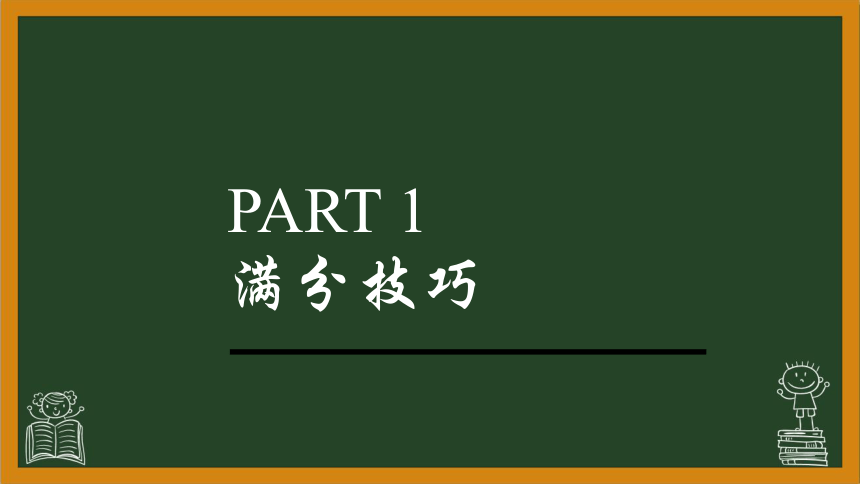


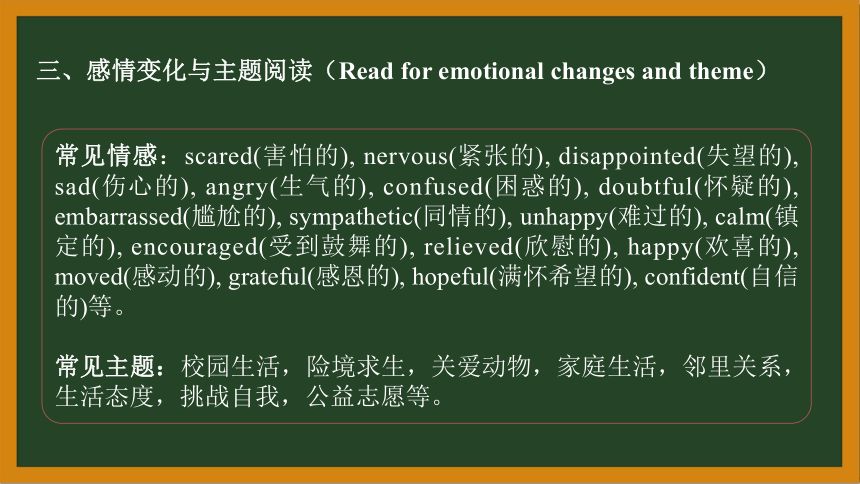
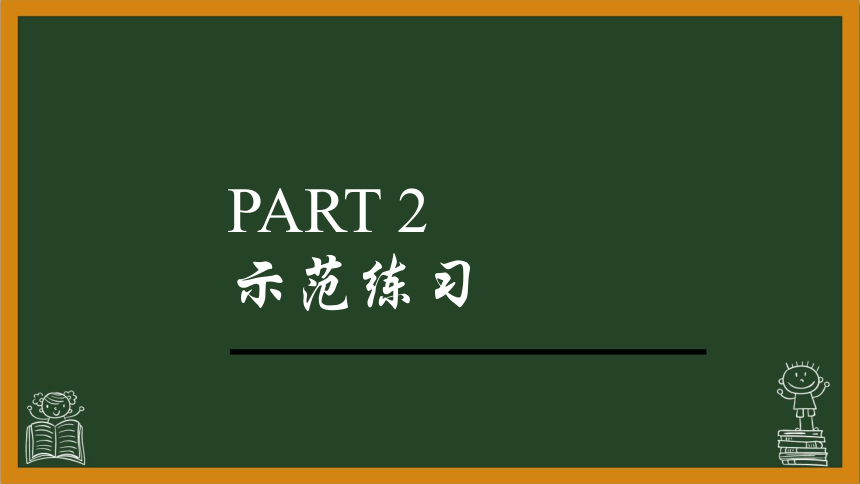
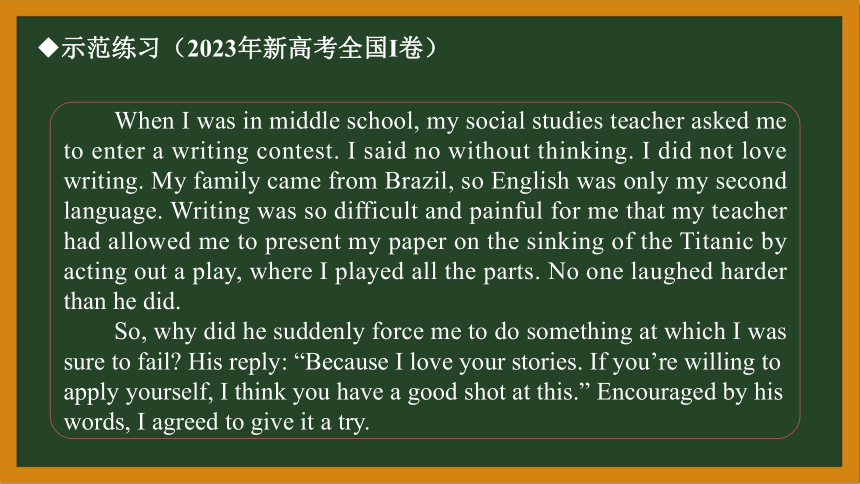

文档简介
(共21张PPT)
读后续写
(一)如何读原文
CONTENTS
满分技巧
Ⅰ
示范练习
Ⅱ
限时检测
Ⅲ
PART 1
满分技巧
一、要素阅读(Read for information)
记叙文一般有六大要素:时间(when)、地点(where)、人物(who)、事件(what)、起因(why)、经过和结果(how),即5W1H。抓住六要素,即可获取原文大意。
高考英语读后续写的语篇多为记叙文,为续写好故事,须在快速阅读原文后,对原文信息进行梳理,包括人物、主题、情节等,确定主体时态,为后续构思打好基础。一般可从以下三大方面理清文章脉络:
二、情节阅读(Read for plot)
三、感情变化与主题阅读(Read for emotional changes and theme)
常见情感:scared(害怕的), nervous(紧张的), disappointed(失望的), sad(伤心的), angry(生气的), confused(困惑的), doubtful(怀疑的), embarrassed(尴尬的), sympathetic(同情的), unhappy(难过的), calm(镇定的), encouraged(受到鼓舞的), relieved(欣慰的), happy(欢喜的), moved(感动的), grateful(感恩的), hopeful(满怀希望的), confident(自信的)等。
常见主题:校园生活,险境求生,关爱动物,家庭生活,邻里关系,生活态度,挑战自我,公益志愿等。
PART 2
示范练习
◆示范练习(2023年新高考全国Ⅰ卷)
When I was in middle school, my social studies teacher asked me to enter a writing contest. I said no without thinking. I did not love writing. My family came from Brazil, so English was only my second language. Writing was so difficult and painful for me that my teacher had allowed me to present my paper on the sinking of the Titanic by acting out a play, where I played all the parts. No one laughed harder than he did.
So, why did he suddenly force me to do something at which I was sure to fail His reply: “Because I love your stories. If you’re willing to apply yourself, I think you have a good shot at this.” Encouraged by his words, I agreed to give it a try.
I chose Paul Revere’s horse as my subject. Paul Revere was a silversmith(银匠) in Boston who rode a horse at night on April 18, 1775 to Lexington to warn people that British soldiers were coming. My story would come straight from the horse’s mouth. Not a brilliant idea, but funny; and unlikely to be anyone else’s choice.
What did the horse think, as he sped through the night Did he get tired Have doubts Did he want to quit I sympathized immediately. I got tired. I had doubts. I wanted to quit. But, like Revere’s horse, I kept going. I worked hard. I checked my spelling. I asked my older sister to correct my grammar. I checked out a half dozen books on Paul Revere from the library. I even read a few of them.
When I handed in the essay to my teacher, he read it, laughed out loud, and said, “Great. Now, write it again.” I wrote it again, and again and again. When I finally finished it, the thought of winning had given way to the enjoyment of writing. If I didn’t win, I wouldn’t care.
A few weeks later, when I almost forgot the contest, there came the news. ________________________________________________
I went to my teacher’s office after the award presentation. ________________________________________________________
Step 1: Read for information
When
Where
Who
What
Why
How
【分析】
本文是一篇记叙文,以人物为线索展开,以第一人称视角描写,讲述了作者作为一个以英语为第二语言的巴西人,在中学时觉得英语写作很难,一开始拒绝接受社会学老师的邀请参加作文比赛,但在老师的鼓励下,决定一试,即便中途很累也没有放弃。完成写作后,作者感受到了写作的快乐,并不再在乎输赢。
记叙文的时间、地点、人物和故事起因一般出现在文章开头,如本篇文章中,从第一段第一句when引导的时间状语从句“When I was in middle school, my social studies teacher asked me to enter a writing contest.”中可得出when, where, who, what四大要素,同时可确定文章主体时态为一般过去时。根据第二段内容可得出故事发展的起因(Why),而故事的发展经过(How)则一般位于文章的中间主体部分。
【参考答案】
When When I was in middle school
Where In middle school
Who I, my social studies teacher
What I entered a writing contest.
Why My teacher’s encouragement
How I worked hard to write the essay and handed it to my teacher.
Step 2: Read for plot
Beginning
Development
Climax
Later development
Ending
【分析】
故事的开篇开门见山,根据第一段中“When I was in middle school, my social studies teacher asked me to enter a writing contest. I said no without thinking.”可知,故事的开端(Beginning)是作者的老师让他参加写作比赛,但是作者拒绝了。根据第二段中“Encouraged by his words, I agreed to give it a try.”可知,受到老师的鼓励,作者决定尝试写作。第三、四段则描述作者为这次写作付出的努力,此为发展(Development)。根据最后一段内容和所给的第一个续写段落开头语可知,作者收到了关于比赛结果的消息,此为高潮(Climax)。根据第二个续写段落开头语可知,后续发展(Later development)是作者去办公室找老师,最后的结局(Ending)则需要学生综合前文所有信息进行合理想象与创作。全文逻辑清晰,抓住关键词句即可找到故事发展的脉络,为续写做充足准备。
【参考答案】
Beginning My social studies teacher asked me to enter a writing contest but I refused.
Development Encouraged by my teacher’s words, I agreed to have a try and worked hard for the essay.
Climax I received the news a few weeks later when I was about to forget the contest.
Later development I went to the teacher and talked to him.
Ending …
Step 3: Read for emotional changes and theme
Emotional changes: (I)
Theme:___________________________________________________
【分析】
根据原文第一段中的“I said no without thinking. I did not love writing. My family came from Brazil, so English was only my second language. Writing was so difficult and painful for me…”可知,作者一开始是自卑的,怀疑自己的英语能力,所以拒绝参加写作比赛,故起初的情绪是doubtful。根据原文第二段中的“Encouraged by his words, I agreed to give it a try.”可知,作者在老师的鼓励下,决定尝试写作,故情绪转变成encouraged。根据最后一段中的“When I finally finished it, the thought of winning had given way to the enjoyment of writing.”以及所给的最后两段续写开头语可知,作者完成作品后,体会到了写作的乐趣,并且在比赛中获奖,是兴奋和感激的,故最后情绪是happy和grateful。
【分析】
通读全文可知,这篇文章旨在告诉大家,只要克服自卑心理,相信自己,并坚持不懈地努力,即便是在不太擅长的领域,也有可能取得进步,获得成功。
【参考答案】
Emotional changes: (I)
Theme:
_______________________________________________________________
It is possible to succeed if you believe in yourself and persist in working hard.
谢
谢
观
赏
读后续写
(一)如何读原文
CONTENTS
满分技巧
Ⅰ
示范练习
Ⅱ
限时检测
Ⅲ
PART 1
满分技巧
一、要素阅读(Read for information)
记叙文一般有六大要素:时间(when)、地点(where)、人物(who)、事件(what)、起因(why)、经过和结果(how),即5W1H。抓住六要素,即可获取原文大意。
高考英语读后续写的语篇多为记叙文,为续写好故事,须在快速阅读原文后,对原文信息进行梳理,包括人物、主题、情节等,确定主体时态,为后续构思打好基础。一般可从以下三大方面理清文章脉络:
二、情节阅读(Read for plot)
三、感情变化与主题阅读(Read for emotional changes and theme)
常见情感:scared(害怕的), nervous(紧张的), disappointed(失望的), sad(伤心的), angry(生气的), confused(困惑的), doubtful(怀疑的), embarrassed(尴尬的), sympathetic(同情的), unhappy(难过的), calm(镇定的), encouraged(受到鼓舞的), relieved(欣慰的), happy(欢喜的), moved(感动的), grateful(感恩的), hopeful(满怀希望的), confident(自信的)等。
常见主题:校园生活,险境求生,关爱动物,家庭生活,邻里关系,生活态度,挑战自我,公益志愿等。
PART 2
示范练习
◆示范练习(2023年新高考全国Ⅰ卷)
When I was in middle school, my social studies teacher asked me to enter a writing contest. I said no without thinking. I did not love writing. My family came from Brazil, so English was only my second language. Writing was so difficult and painful for me that my teacher had allowed me to present my paper on the sinking of the Titanic by acting out a play, where I played all the parts. No one laughed harder than he did.
So, why did he suddenly force me to do something at which I was sure to fail His reply: “Because I love your stories. If you’re willing to apply yourself, I think you have a good shot at this.” Encouraged by his words, I agreed to give it a try.
I chose Paul Revere’s horse as my subject. Paul Revere was a silversmith(银匠) in Boston who rode a horse at night on April 18, 1775 to Lexington to warn people that British soldiers were coming. My story would come straight from the horse’s mouth. Not a brilliant idea, but funny; and unlikely to be anyone else’s choice.
What did the horse think, as he sped through the night Did he get tired Have doubts Did he want to quit I sympathized immediately. I got tired. I had doubts. I wanted to quit. But, like Revere’s horse, I kept going. I worked hard. I checked my spelling. I asked my older sister to correct my grammar. I checked out a half dozen books on Paul Revere from the library. I even read a few of them.
When I handed in the essay to my teacher, he read it, laughed out loud, and said, “Great. Now, write it again.” I wrote it again, and again and again. When I finally finished it, the thought of winning had given way to the enjoyment of writing. If I didn’t win, I wouldn’t care.
A few weeks later, when I almost forgot the contest, there came the news. ________________________________________________
I went to my teacher’s office after the award presentation. ________________________________________________________
Step 1: Read for information
When
Where
Who
What
Why
How
【分析】
本文是一篇记叙文,以人物为线索展开,以第一人称视角描写,讲述了作者作为一个以英语为第二语言的巴西人,在中学时觉得英语写作很难,一开始拒绝接受社会学老师的邀请参加作文比赛,但在老师的鼓励下,决定一试,即便中途很累也没有放弃。完成写作后,作者感受到了写作的快乐,并不再在乎输赢。
记叙文的时间、地点、人物和故事起因一般出现在文章开头,如本篇文章中,从第一段第一句when引导的时间状语从句“When I was in middle school, my social studies teacher asked me to enter a writing contest.”中可得出when, where, who, what四大要素,同时可确定文章主体时态为一般过去时。根据第二段内容可得出故事发展的起因(Why),而故事的发展经过(How)则一般位于文章的中间主体部分。
【参考答案】
When When I was in middle school
Where In middle school
Who I, my social studies teacher
What I entered a writing contest.
Why My teacher’s encouragement
How I worked hard to write the essay and handed it to my teacher.
Step 2: Read for plot
Beginning
Development
Climax
Later development
Ending
【分析】
故事的开篇开门见山,根据第一段中“When I was in middle school, my social studies teacher asked me to enter a writing contest. I said no without thinking.”可知,故事的开端(Beginning)是作者的老师让他参加写作比赛,但是作者拒绝了。根据第二段中“Encouraged by his words, I agreed to give it a try.”可知,受到老师的鼓励,作者决定尝试写作。第三、四段则描述作者为这次写作付出的努力,此为发展(Development)。根据最后一段内容和所给的第一个续写段落开头语可知,作者收到了关于比赛结果的消息,此为高潮(Climax)。根据第二个续写段落开头语可知,后续发展(Later development)是作者去办公室找老师,最后的结局(Ending)则需要学生综合前文所有信息进行合理想象与创作。全文逻辑清晰,抓住关键词句即可找到故事发展的脉络,为续写做充足准备。
【参考答案】
Beginning My social studies teacher asked me to enter a writing contest but I refused.
Development Encouraged by my teacher’s words, I agreed to have a try and worked hard for the essay.
Climax I received the news a few weeks later when I was about to forget the contest.
Later development I went to the teacher and talked to him.
Ending …
Step 3: Read for emotional changes and theme
Emotional changes: (I)
Theme:___________________________________________________
【分析】
根据原文第一段中的“I said no without thinking. I did not love writing. My family came from Brazil, so English was only my second language. Writing was so difficult and painful for me…”可知,作者一开始是自卑的,怀疑自己的英语能力,所以拒绝参加写作比赛,故起初的情绪是doubtful。根据原文第二段中的“Encouraged by his words, I agreed to give it a try.”可知,作者在老师的鼓励下,决定尝试写作,故情绪转变成encouraged。根据最后一段中的“When I finally finished it, the thought of winning had given way to the enjoyment of writing.”以及所给的最后两段续写开头语可知,作者完成作品后,体会到了写作的乐趣,并且在比赛中获奖,是兴奋和感激的,故最后情绪是happy和grateful。
【分析】
通读全文可知,这篇文章旨在告诉大家,只要克服自卑心理,相信自己,并坚持不懈地努力,即便是在不太擅长的领域,也有可能取得进步,获得成功。
【参考答案】
Emotional changes: (I)
Theme:
_______________________________________________________________
It is possible to succeed if you believe in yourself and persist in working hard.
谢
谢
观
赏
